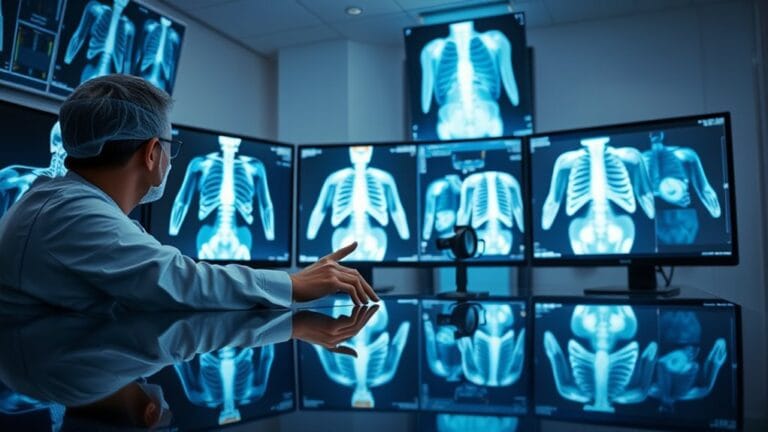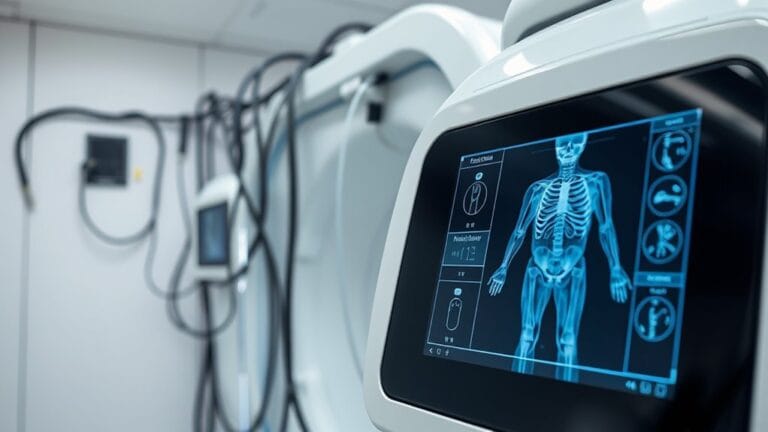AI’s Revolutionary Imaging Tech: Transforming Patient Care?
Did you know that AI can improve diagnostic accuracy by up to 30% in certain medical imaging scenarios? This remarkable advancement not only reduces the chances of errors but also streamlines the workflow for healthcare professionals. You might wonder how this technology is reshaping patient care in ways that were previously unimaginable. As we explore the implications of AI's integration into imaging, it's crucial to evaluate both the potential benefits and the challenges that come with such a transformation. What does this mean for the future of healthcare? If you'd like to learn more or need assistance with this topic, feel free to contact us. We can connect you with experts who can provide tailored solutions.
Enhancing Diagnostic Accuracy
With the advent of AI algorithms, enhancing diagnostic accuracy in medical imaging has become more achievable than ever. These imaging algorithms excel in pattern recognition, allowing them to detect subtle anomalies that human eyes might overlook. Trained on extensive datasets, AI systems have shown remarkable proficiency in diagnosing complex conditions, such as cancer and neurological disorders.
For instance, studies reveal that AI can match or even surpass human radiologists in identifying diseases like pneumonia on chest X-rays, achieving an impressive 99.1% sensitivity rate compared to the 72.3% typical for radiologist reports. This consistent accuracy helps reduce human error, particularly in cases influenced by fatigue or oversight. Additionally, AI-enhanced image analysis has been recognized for significantly improving diagnostic processes in various medical scenarios.
AI's capabilities extend to recognizing early signs of breast cancer on mammograms, lung nodules on CT scans, and Alzheimer's indicators on MRIs. By segmenting and labeling structures in medical images with high precision, these algorithms enhance the clarity and quality of images.
This improved quality not only aids in accurate diagnoses but also supports timely treatment decisions, ultimately improving patient care and outcomes. In this evolving landscape, AI's role in enhancing diagnostic accuracy is pivotal for healthcare professionals dedicated to serving others.
Accelerating Diagnosis Time
AI technology is transforming the landscape of medical imaging by markedly accelerating diagnosis time. With AI tools, MRI analysis time is reduced by 30%, and report processing can be slashed by half. A recent study highlighted that spine MRI exam durations could decrease by 70% without sacrificing image quality.
Traditional image interpretation methods are often time-consuming and prone to human error, but AI notably mitigates these issues. In fact, AI's integration has contributed to a 30% improvement in decision-making accuracy, which is crucial for timely patient care.
AI's rapid image analysis is essential, especially in emergency situations where every second counts. By processing and analyzing images faster than human radiologists, AI enables quicker treatment decisions, ultimately leading to earlier patient recovery.
The automation of repetitive tasks, such as image segmentation and preliminary assessments, frees up clinicians to focus on more complex cases, enhancing overall patient care.
Moreover, integrating AI with existing diagnostic processes streamlines workflows, allowing for more efficient handling of urgent cases. AI algorithms prioritize worklists to guarantee critical patients receive immediate attention, further improving response times.
Improving Healthcare Workflow Efficiency
Efficient healthcare workflows are essential for delivering timely patient care, and integrating advanced imaging technologies can greatly enhance these processes. By leveraging AI, you can achieve significant workflow optimization, ensuring that imaging data is seamlessly integrated with electronic health records. This offers a thorough view of patient history, allowing for informed decision-making.
AI-driven worklist prioritization assigns high-priority studies to the most suitable physicians, minimizing patient wait times. Automated study prioritization addresses critical conditions swiftly, improving both patient care and labor utilization. AI systems drive worklist prioritization to ensure that urgent cases are handled first, leading to better overall patient outcomes.
With a unified worklist consolidating tasks—such as Radiology-ED communication and mammography imaging review—you're streamlining quality and interpretation workflows.
AI also enhances radiology workflows by optimizing study orders, cutting unnecessary scans, and decreasing turnaround time. AI-assisted protocols tailored to the likelihood of critical findings further enhance patient satisfaction.
Additionally, generating preliminary reports allows radiologists to focus on complex cases rather than documentation, thanks to task automation.
Personalizing Patient Care
Personalizing patient care hinges on the integration of thorough data sources, creating a holistic view of each individual's health. By combining genetic information, electronic health records, imaging data, and wearable device data, AI builds extensive patient profiles. This integration allows you to develop tailored therapies that consider unique medical histories and genetic characteristics.
AI enhances precision medicine by analyzing imaging data alongside patient history to improve diagnostic accuracy and treatment effectiveness. With predictive analytics, you can anticipate disease progression and estimate responses to specific treatments, enabling early interventions and customized care. This proactive approach fosters greater patient engagement, as individuals feel more involved in their treatment plans.
Moreover, AI identifies risk factors, guiding healthcare providers in developing targeted interventions. By analyzing genetic variations and their correlations with diseases, AI supports informed decision-making and personalized drug therapies. Additionally, AI's ability to analyze vast datasets enhances early disease detection, ensuring timely and effective treatment options.
Continuous monitoring through AI-enabled wearables ensures real-time tracking of crucial signs and activity levels, allowing for prompt interventions when necessary. Ultimately, these advancements promote treatment adherence, making sure patients receive the right care tailored to their specific needs.
Market Growth and Technological Innovations
The global AI in medical imaging market is set to experience explosive growth, expanding from USD 1.27 billion in 2024 to an anticipated USD 11.76 billion by 2033, reflecting a remarkable CAGR of 28.19%. This surge presents significant market opportunities for healthcare providers, AI developers, and investors alike.
In the U.S. alone, the market is projected to grow from USD 223.80 million in 2024 to over USD 2.2 billion by 2033, driven by innovations in deep learning algorithms and advanced image processing techniques. Additionally, the AI in MRI market is projected to increase from USD 5.6 billion in 2022 to USD 9.89 billion by 2032, further illustrating the expanding role of AI technology in medical imaging.
Technological advancements are revolutionizing the competitive landscape, enhancing the accuracy and efficiency of medical image analysis. AI-based diagnostic tools expedite the interpretation of complex images, enabling early disease detection and improving patient outcomes.
Innovations like convolutional neural networks and generative adversarial networks allow for rapid detection of abnormalities, fundamentally changing disease diagnosis.
As government initiatives support AI integration in healthcare, the demand for improved management of extensive datasets propels this market's expansion.
With these developments, healthcare practitioners can automate routine tasks, thereby optimizing diagnostic processes and delivering personalized treatment plans, ultimately benefiting patient care.
Frequently Asked Questions
How Does AI Handle Patient Data Privacy in Medical Imaging?
AI handles patient data privacy in medical imaging through data encryption and consent management. You guarantee sensitive information remains protected while obtaining explicit consent, maintaining compliance with regulations and fostering trust between patients and healthcare providers.
What Are the Limitations of AI in Medical Imaging?
AI in medical imaging faces limitations like bias recognition and algorithm transparency issues. These challenges lead to potential misdiagnoses, as unclear processes can diminish your trust in AI's decisions and hinder effective patient care.
How Can Healthcare Professionals Be Trained to Use AI Tools Effectively?
To train effectively, you should explore AI training methods focused on hands-on experience and case studies. Implement user engagement strategies like interactive modules and simulations, ensuring you develop practical skills for real-world healthcare applications.
What Is the Cost of Implementing AI in Medical Imaging?
Implementing AI in medical imaging requires thorough cost analysis. You'll face implementation challenges, including integration with existing systems, training staff, and ongoing maintenance, which can range from $50,000 to $200,000, depending on complexity and customization needs.
How Does AI Impact the Role of Radiologists in Healthcare?
AI greatly enhances your role as a radiologist by improving accuracy, streamlining workflow efficiency, and providing diagnostic support. This technology integration fosters collaborative analysis, leading to better patient outcomes and more effective healthcare delivery.
Conclusion
Incorporating AI into medical imaging is more than just a technological advancement; it's a game changer for patient care. With studies showing that AI can reduce diagnostic errors by up to 30%, the potential for saving lives is immense. By enhancing accuracy and speeding up diagnoses, AI empowers healthcare professionals to focus on what truly matters—providing personalized care. As this technology continues to evolve, we can expect even greater improvements in patient outcomes and overall healthcare efficiency.
If you have questions or need assistance with implementing AI in your medical practice, don't hesitate to reach out to us. Our expert help can save you time, reduce stress, and significantly improve your practice. Embrace the future of patient care with confidence!





